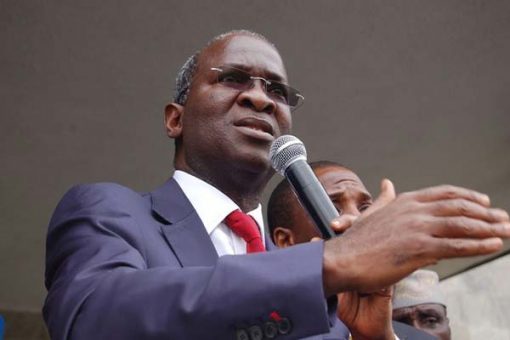Minister of Works and Housing, Mr Babatunde Fashola, (SAN) has submitted that urban centres are responsible for most of the global energy consumption and by extension a huge portion of greenhouse emissions in the world, leading to disruptions of the natural environment.
Speaking on this year’s “World Habitat Day and World Cities Day”, themed: ‘’Accelerating Urban Action for a Carbon-free World” and ‘Adapting Cities for Climate Resilience’’, Fashola disclosed that today, 55 per cent of the world’s population lives in cities and towns.
He explained that the figure continues to grow every day, noting that urbanisation presents some of the most significant challenges and opportunities globally.
“The numerous cities that dot our landscape are centres for economic growth and development, but they also face demographic, environmental, economic and social challenges which we must address.
“As you are aware, cities account for 75 per cent of the world’s energy consumption and are responsible for over 70 per cent of global greenhouse gas emissions; with transport, buildings, energy, and waste management accounting for the bulk of urban carbon emissions.
“The future of our planet depends on national, regional and local governments and organisations, communities, academic institutions, the private sector and all relevant stakeholders working together to create sustainable, carbon neutral, inclusive cities and towns,” he stated.
According to him, Nigeria currently experiences several challenges associated with climate change, including extreme changes in weather conditions, desertification which affects the eleven frontline states in the northern part of Nigeria, and occurrences of natural disasters.
Fashola, who was represented by the Director of Works in the ministry, Mr. Jide Martin, listed the natural disasters as flooding, bush fires, rising sea levels, coastal erosion, threat to recreational water fronts and inland gully erosions, describing them as serious threats to security of human life, property, health, economic and social welfare.
To mitigate these challenges, he said that the federal government had been making efforts to adapt cities in Nigeria for climate resilience through the ongoing review of the Nigeria’s 2012 national urban development policy to harness problems of climate change and urbanisation in Nigeria.
Fashola said that although the pace of completing the review process was delayed by the challenges of managing Covid-19 pandemic, the coming of the pandemic had further compelled the need to quickly conclude and start applying the new policy for common good of all.
He explained that the government had activated the roadmap for Nigeria’s housing and urban development sector and is in the process of producing a national land policy; and a strategic national physical development plan to induce far-reaching reforms in land administration in Nigeria.
According to him, to further support the efforts, the government is actively committed to the upgrading of urban slums across Nigeria through the urban renewal and slum upgrading programme of the federal ministry of works and housing.
The minister pointed out that considerable strides had been made in the execution of the programme to the tune of about N1.5 billion between 2019 and 2020, stressing that in the last five years, the ministry had successfully provided solar-powered street lights in some states and reversal of the expansion of slums across Nigeria.
In his address, Permanent Secretary in the ministry, Babangida Hussaini, noted that the programme was to draw attention to the state of the world’s cities and towns to identify challenges, gaps and opportunities for appropriate action.



